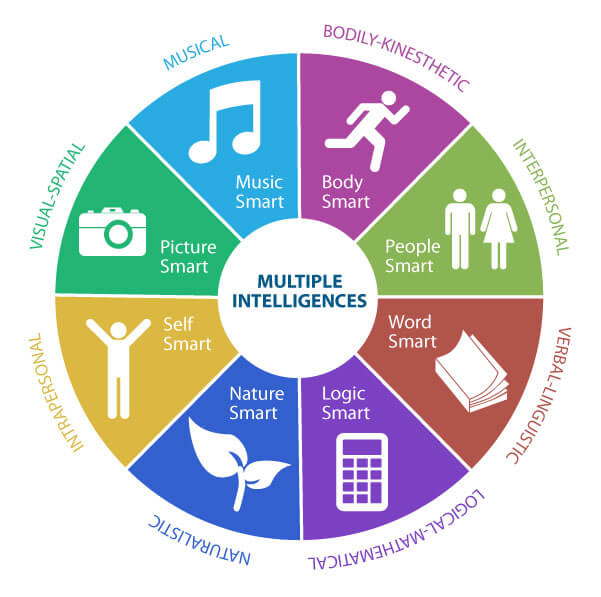8 TYPES OF INTELLIGENCE AND HOW TO IMPROVE YOUR IQ SCORE?
Human always admire and respect people with high IQ score such as Albert Einstein, Alfred Nobel, Leonardo da Vinci,… and desire to improve your IQ score and have such an amazing intelligence and abilities.
Along with youth, wealth and beauty, human also have a precious treasure called intelligence. Today there are some standardized tests that psychologists and educators used to measure a person’s intelligence. The terms IQ, general cognitive ability, general intelligence and general mental ability all refer to what cognitive tests measure – which only evaluate primary skills such as mathematical skill, verbal fluency and spatial visualization.
The general intelligence model only measure limited skills which can be analyzed. So what about a musical genius who is not good at spelling or a brilliant linguist who has trouble with fractions? What if intelligence could be quantified in a more qualitative and open-minded way?
According to Dr. Howard Gardner, a psychologist and professor of neuroscience from Harvard University, there’s not only one but also many different types of intelligence. The researches applied on both adults and children help him discover different ways people study and perform.
He assumed that different parts of brain have a close connection with different types of intelligence. And he developed the theory of Multiple Intelligences (MI) in 1983. The theory stated that there are 8 types of intelligence – 8 ways to become better. Gardner believes that that’s not about how much intelligence you are, but about which aspect you are intelligence.

Below are 8 types of intelligence that help you recognize your abilities. Then you can easily find ways to develop it and find the environment as well as conditions to have the best performance.
1. Musical intelligence
.jpg)
2. Bodily – kinesthetic intelligence
.jpg)
3. Interpersonal intelligence
.jpg)
4. Verbal – linguistic intelligence
.jpg)
5. Logical – mathematical intelligence
.jpg)
6. Naturalistic intelligence
.jpg)
7. Intrapersonal intelligence
.jpg)
8. Visual – spatial intelligence
.jpg)
Now you all know what types of intelligence you are, but how to develop it so that you can improve your IQ score? Here are some tips:
1. Changing your routine

Meditate: the second way to improve your IQ score is meditation. It’s not only help reduce stress, but also is good for brain functioning. Meditation has been shown to improve blood flow to the brain, concentration, memory and patience.
Doing exercise: Running, swimming or doing aerobics twice a day for 45 minutes when you wake up and before going to bed not only help you get in fit, but also improve your mood. The more endorphins you release when doing exercise, the more active your brain is.
Sleep whenever your brain wants: you need to make sure to sleep when your brain wants it and sleep enough 7 – 9 hours a day. Inadequate sleep prevent your brain developing and lead to many mental and physical illnesses.
2. Practicing your skills

Play games: to keep your brain churning away at high speeds, it’s good to do puzzles and problem – solving games.
Take the tests over and over: IQ tests are not the same as the test to take at school. They have a similar structures but the questions are changing all the time. Therefore, the more you take it, the better you’ll do.
3. Changing your diet
.jpg)
Snack on dark chocolate: Although chocolate is sweet, but dark chocolate contains a huge amount of magnesium, vitamins A, B1, B2, D and E3, which help your body stay healthy and strong.
Avoid processed and junk foods: A healthy diet has a connection with a high IQ, especially in children. So the last way to improve your IQ score is to avoid eating junk food like cookies, chips and processed food.
Maybe you are interested
What does an iq of 200 mean?
What does an iq of 194 mean?
what does an iq of 190 mean?
What does an iq of 116 mean?
What does an IQ of 112 mean?
what does an IQ of 108 mean



